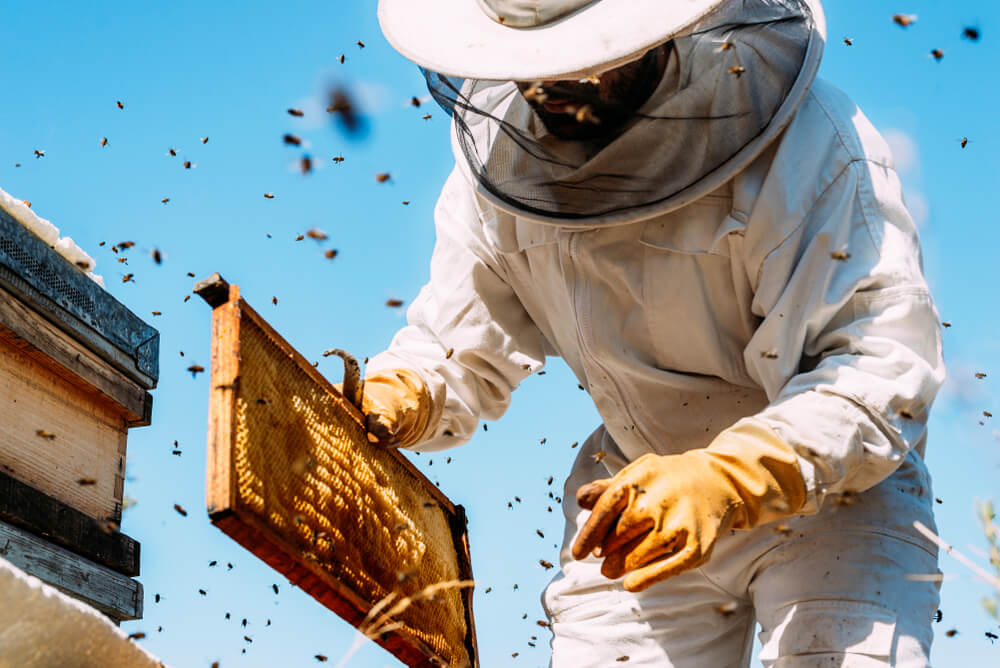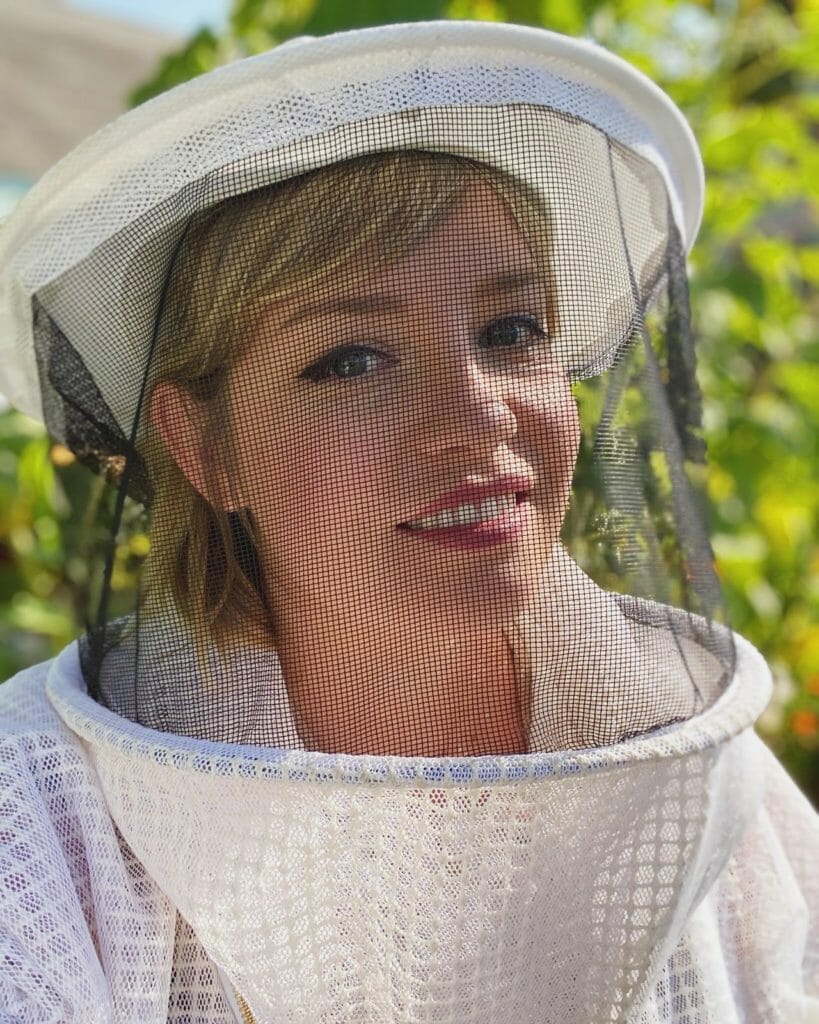It’s best to 'bee' informed.

The silver lining to the COVID-19 crisis is that many people are starting to live and eat a bit more sustainably by dabbling in homesteading and becoming more self-sufficient.
More people are growing their own vegetables and raising chickens in their backyards. And as the weather gets warmer, some have turned to another new agricultural hobby: beekeeping. In recent weeks, beekeepers associations have seen a rise in interest and an influx of aspiring beekeepers.
Hilary Kearney, a seasoned beekeeper, author, and the vice president of the San Diego Beekeeping Society, has been flooded with daily online questions from those who have chosen to purchase their own colony of bees since the pandemic started. Kearney spoke with Modern Farmer to dish out the facts on beekeeping basics for those planning to start their own apiary.
The following interview has been edited and condensed for clarity.
Modern Farmer: What advice would you give to someone who is interested in backyard beekeeping right now?
Hilary Kearney: My main advice is for people to do a lot of research. I think there’s this kind of attitude about beekeeping where people don’t think of the bees as animals. They think of it more as like getting into gardening or setting up a birdhouse. You can’t just set up a beehive and expect it will take care of itself.
If they don’t know what they’re walking into, they often end up killing their bees. When your beehive dies, that’s significant. You can actually do harm to other beekeepers in the area. If you let your hives get sick, for example, it can actually spread that to other colonies.
MF: And where would you suggest people go to do their research ?
HK: Right now, the usual channels for education have shifted because of COVID-19. The best way to learn [about] beekeeping is usually in person with another beekeeper. A lot of local beekeepers will do mentoring or they’ll do hands-on classes, but unfortunately, in most places, we can’t do that right now.
So another option is to look online and see if you can connect with a local beekeeper or beekeeping organization. Check out your local universities and well-known bee research universities too. A lot of times, they have YouTube channels. Some of them are offering webinars right now and free courses in beekeeping. I personally have two online classes for beginners, which I already had in place because my following is worldwide. But it’s been more useful to have that now more than ever.

Hilary Kearney, a full-time beekeeper, author and beekeeping educator is based in San Diego, California. Photo courtesy of Hilary Kearney.
MF: You’ve had to deal with a lot of questions with the increased interest in beekeeping. What are some of the common mistakes you’re seeing people make or what are the things people are generally misinformed about?
HK: There are people called queen breeders who sell queen bees to beekeepers. When you’re buying a queen bee, you’re buying that queen for an existing colony that just needs the new queen. But a lot of new beekeepers think that is how you start your colony. They think that you just buy the singular queen bee and then she somehow attracts the colony to her. That’s dead wrong.
When you’re purchasing bees, you want to look for what’s called a starter colony, also called a nucleus colony.
MF: What should people think about when they’re buying their bees?
HK: I always encourage people to find someone local. Local breeders are going to have bees that are adapted to your climate that will survive. Think about your climate, so you buy from someone local or someone in a climate that is similar to yours.
MF: One thing that you mentioned earlier was that bees need proper care. What does that look like?
HK: People should be doing what are called hive inspections. After you get your bees, it’s important to regularly check on them to make sure that they’re healthy. A lot of new beekeepers get intimidated and then procrastinate on opening the hive or ever doing anything with them. You can’t harvest honey if your colony isn’t doing well. But what often happens with a lot of colonies is they do well in the spring, and might make honey whether you check them or not, and then they die of disease in the fall.
MF: And how would someone know that the bees aren’t doing well?
HK: You actually have to go in and look at the comb and learn what you’re looking at and what it means. Look for what’s called a healthy brood pattern. An easy way for beginners to tell if it’s unhealthy is if the larva at a certain point in its development becomes cast over with a beeswax capping. If the colony is healthy, you’ll see this big patch of all larva bound tightly together. If it’s unhealthy, it’ll look like there are empty cells. It’s called a shotgun pattern and it looks like a buckshot spray. So there will be this uneven pattern in the brood nest. It’s not going to tell you what’s wrong with your colony or what to do, but at least this will alert you that something’s not right and then you can get help from a more experienced beekeeper.
MF: What’s a good sign that honey is ready to be harvested?
HK: So, typically, when you’re a new beekeeper, the rule of thumb is not to harvest in the first year. That’s what people advise and that’s because your colony is brand new. They haven’t had a lot of time to get established.
You know it’s ready by looking at the combs because when the honey is ready it will be capped over. I usually tell people when it’s 70 percent capped, you can take that piece of the comb. Sometimes you’ll see in the brood nest where the babies are, little areas of honey on the same piece of comb and that beekeepers should not harvest that honey. You want to wait until you have a full piece of comb that’s only honey with no baby bees on it. That’s what you would harvest.
MF: How much does this typically cost to have your own backyard operation?
HK: It’s kind of an expensive hobby, or an expensive trade if you end up doing it as a business. I think that some people are taken aback by that. A bee box setup is going to be about $150 or more. And then the bees themselves can cost $150 to $300 depending on where you are. If you ever need to replace your queen, the queen costs like $20 to $50 sometimes, but often you have to pay overnight shipping, which can be really expensive.
The bee suits themselves are $100 -$200, plus there are other tools that you need to get. (More info on essential gear here).
MF: What about time? Is it time consuming?
HK: Most of the time investment is in learning. So putting time into reading, getting lots of books, taking classes, researching things that you’re seeing, you know, and just diving into that knowledge. That’s where most of your time gets spent as a new beekeeper and once you understand what you’re doing, which I think for most people really takes two years before they really feel like they understand what they’re even doing.
It’s not like caring for a dog where you’re going to have to be on dog duty 24/7. You’re only checking your hives once every two to four weeks in the spring and summer. It takes about an hour to do a hive inspection, but you could go on vacation for three weeks and your hive is probably going to be fine.
MF: Is there anything else people need to know before they get started?
HK : The best beekeepers are the ones that have developed a love of honeybees and the love of learning about them. Focus on understanding how these bees live without a beekeeper to get a good understanding of their behavior and their biology. And know what actually goes on inside the beehive before you start focusing on beekeeping techniques. If you can grasp an understanding of the honeybee first, you’re going to be a lot more successful.
How can I connect with Hillary Kennedy the beekeeper I’m a beekeeper myself and have a special project for her I’m also live in San Diego. Working on a project in Africa called a bio fence using bees to keep the elephants out of the agricultural areas.
It is best to know beforehand what crops are being grown and what pesticides are being used by the local farmers. If the pesticides being used for annual monocultural crops are incompatible with bees then you are wasting your time as you will have the same challenges year after year . Predators are a problem …even humans if they can see and have access to the hives they will steal them for the black market bee rustling industry ..no hive is too small !! Most first time bee hobbyists lose their hives during their first winter of operation because they… Read more »
Hillary has been so beneficial to so many people. Many people in San Diego have been helped with their hobby.
PennState is offering a Beekeeping 101 course online. It is very thorough and interesting.
As proof to recent stealing of hives …got to watch out for these people !
https://www.castanet.net/news/Vernon/300253/30-bee-hives-stolen-from-Schubert-Road-in-Armstrong
I would like to share with others